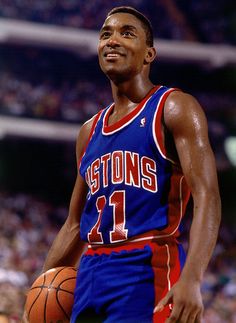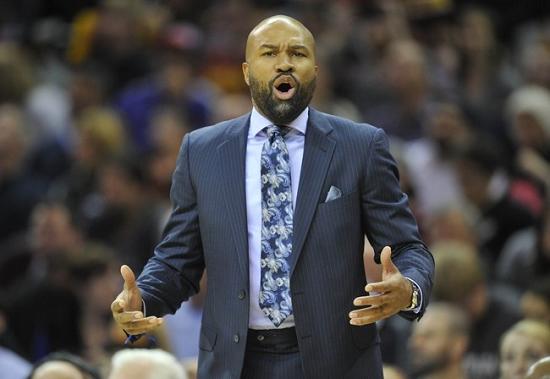VACATION REWIND: Five quick 'Sports and HR' takes from NBA Summer League
NOTE: I am out of pocket more or less until the New Year, so I thought I would re-air a few pieces that I liked from earlier this year for folks who may have missed them the first time. Hope you are having a great holiday season and a Happy New Year!
From July - Five Quick 'Sports and HR' takes from NBA Summer League
I am out at the NBA's summer vacation also known as Summer League in Las Vegas joined by a couple of members of the 8 Man Rotation crew, Kris 'KD" Dunn and Matt 'Matty Ice, akaBruno' Stollak.
As in the past sojourns to NBA Summer League, the reason to attend is not just about the basketball. In fact it is perhaps not even half about the basketball. Rather it is for what happens and is happening outside the lines - the observations of members of NBA team management, league staff, players on the sidelines, and the general approach towards talent management that the different teams take as they all strive to reach the same goal - an NBA championship - in many, many different ways.
Add in the natural sideshow/carnival atmosphere that is Las Vegas, and Summer League becomes just about the perfect confluence (for me), of sports, Talent Management, development, management philosophy, and business strategy played out in the open and in real time.
So with that said, here are my first five quick takes from about a day and a half out at Summer League:
1. A little bit of 'real' experience makes a huge difference. The best players in this year's Summer League have tended to be more experienced players like Devin Booker, D'Angelo Russell, and even the Nets' Sean Kilpatrick. One commonality across these players? They all have at least one full year experience in the NBA already and have come back to Summer League to continue to work on and refine their games. These players and others have shown how much even one year of development and experience makes a huge difference in performance. The lesson to me for managers of talent is that of patience. Even in this world of 'go-go-go', it often pays to invest in talent and development and to be patient to realize increased benefits later on. In other words, don't look at new employees just as ones that have no idea what they are doing, try to envision the value that they can deliver after a year of prep and learning.
2. Stakes matter, i.e., if you give someone a lousy project don't be that surprised if their performance dips. Friday's games at NBA Summer League were all loser's bracket games - the final game of the summer for teams that had been eliminated from Summer League title contention. Basically, there was nothing on the line in terms of team goals in these games. And perhaps not surprisingly, the quality of play suffered. Even though many of the players had plenty personally at stake in these games, collectively they had no goals in common. The result was a day of mostly sloppy play, bad shooting, ill-advised shot attempts, and generally bad basketball. The real world implication of this? When you give employees and teams thankless, low-profile, and low-impact work they are naturally going to be tempted to give less or worse effort. That is just human nature. Don't judge someone solely on how they perform when the nature of the assignment drags their performance down a notch or two.
3. But great organizations and leaders rise above these lousy circumstances. The best game amongst the losers, featured the Spurs topping the Kings in overtime. The game was entertaining because it went down to the wire sure, but the real reason I enjoyed the contest was that the Spurs, probably the league's best-run organization over the last 20 years, took such a professional, competent, and serious approach to the game, one that meant nothing in terms of the outcome. The players were engaged, the coaching, led by Becky Hammon, was exceptional, and the execution of the team when it mattered most was excellent, resulting in the win. So while I just said you can't judge individuals solely when things are going bad, you can see how world-class organizations get that way by seeing how they approach bad situations. The Spurs looked and acted like this meaningless game really did matter - and to great organizations everything matters, which helps make them great.
4. Talent trumps everything. But you already knew that. The last game we caught on Friday night involved the Philadelphia 76ers and their new star, first pick in the 2016 draft Ben Simmons. Simmons was clearly the best athlete, had the best basketball instincts, and at times was held back by the inferior talent he was playing with and against. The key for Simmons' early development seems to be that he needs to understand both how good he is, and what he needs to do to improve. Simmons is a great rebounder and passer, but probably needs to work on his shooting in order to realize his full potential. It would be easy for him to stick with what he is comfortable doing, and excels at doing at the expense of working on the parts of his game that need improvement and he seems uncomfortable with (at least at the moment). But to be the best he can be, he needs to do more than just one or two things. HR lesson? The greatest talent can do more than one or two things exceedingly well, but they might need to be pushed a little to do those things that are uncomfortable with. But if you can and do that, then youu develop the rarest of commodities - someone who excels at all aspects of the game/job/function.
5. You have to judge talent on performance, not by appearance. We had the chance to watch (and very briefly meet), NBA prospect Josh Magette, a point guard who starred in the NBA's Developmental League last season, and is playing for the Brooklyn Nets summer league squad. Magette was probably the best point guard in the D-League last season, and has a real opportunity to break into the NBA this season. That means he is probably one of the best 500 - 1000 or so basketball players in the world right now. And Josh is listed at 6'1" , 160 pounds. And after seeing him up close, let's say those measurements are generous. Josh looks like he could still be playing high school ball, is not physically imposing at all, but yet can compete at the highest levels of basketball against guys that have six inches and 60 pounds on him. If you saw Josh on the street you would never think he was in upper echelon of basketball players in the world. And you'd be dead wrong. Final lesson from Summer League? Talent is everywhere - even in places you'd never expect to find it, and are often afraid to look.
That's it - I'm out for now and about to hit another full day at the Thomas & Mack Center - there might be a wrap post up early next week for those of you, (both of you), who can't get enough of these sports and HR takes.
Have a great and exciting and prosperous 2017!
 Vacation,
Vacation,  sports tagged
sports tagged  8 Man Rotation,
8 Man Rotation,  HR,
HR,  Sports,
Sports,  basketball,
basketball,  vacation
vacation  Email Article
Email Article 
 Print Article
Print Article 



